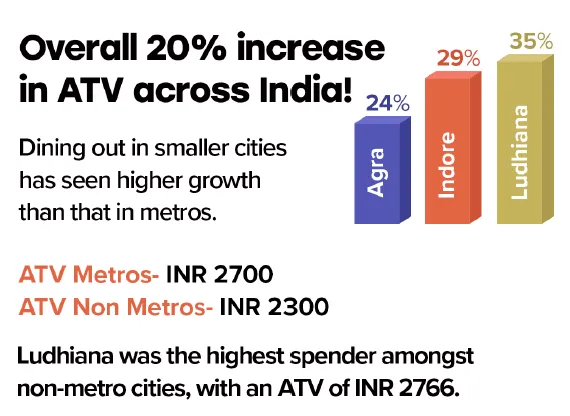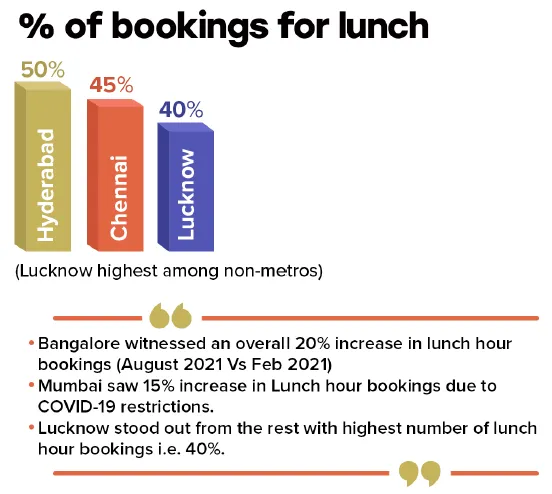Revenge dining at vaccinated restaurants on the upswing: Dineout report
Delhi and Kolkata show maximum recovery after the devastating second COVID-19 wave. Twenty percent increase in average transaction value across India.
After revenge travel, Indians are indulging in revenge dining with top restaurants recording housefuls not only on weekends but over weekdays as well. Even as the jury is out on when the third COVID-19 wave will hit, it seems Indians are making hay while the sun shines.
Delhi, Kolkata, and Hyderabad have shown the maximum recovery among metros with Delhi and Kolkata operating at nearly double of February 2021 levels before the devastating second wave of COVID.
A report released by dining out and restaurant tech platform Dineout added that smaller towns are showing more than double the vengeance when it comes to resuming eating out. The report says Jaipur and Ludhiana have shown maximum recovery and are operating at more than double of February 2021 levels.

The report also revealed that the average order value at restaurants in July-August has increased by as much as 20 percent since February, with smaller cities like Agra (24 percent), Indore (29 percent), and Ludhiana (35 percent) registering the biggest surge in restaurant order value.
It claims this is “owing to the rise of luxury and fine-dining outlets in smaller cities, and that a significant number of professionals are now working out of their hometowns and spending heavily on dining out”.
Attributing revenge dining to higher disposable income because of work from home lifestyles, the report says that luxury dining across India has increased by as much as 120 percent and fine dining by 105 percent, and the average number of diners per booking has also risen.
Many corporate offices have already started operating at capacity resulting in an increase in the lunch hour rush at restaurants. According to the report, 39 percent of bookings were for lunch hours in August this year compared to 27 percent in February.
Hyderabad (50 percent) and Chennai (45 percent) saw maximum business during lunch hour, while Bangalore saw an increase in lunch hour bookings from 24 percent in February to over 44 percent in August owing to the continuing 9 pm curfew.

Preference for vaccinated restaurants
Thankfully, consumers are also doing their homework when it comes to settling for fully vaccinated restaurants where both the kitchen and serving staff are vaccinated.
Out of 50,000 outlets across 20 cities listed on Dineout, around 67 percent of outlets have fully vaccinated staff.
Interestingly, these outlets have contributed 72 percent of the total business in August this year, with Ludhiana, Kolkata, Jaipur, Lucknow, Delhi, and Bangalore boasting the highest percentage of dining out at vaccinated outlets.
“It's understandable why millions are now thronging to their favourite eating joints as the COVID-19 health advisory is lifted, and that they can finally step out. At Dineout, we are confident that the premier sanitation and hygiene-related measures such as fully vaccinated staff and socially distanced seating will reassure diners as we brace to take on this ‘new normal',” Ankit Mehrotra, Co-founder & CEO of Dineout, said in a statement.
Founded in 2012 by Ankit Mehrotra, Nikhil Bakshi, Sahil Jain, and Vivek Kapoor, Dineout is a restaurant discovery and booking platform processing more than 100 million diners and $900 million worth of transactions for its partner restaurants across its network of 50,000 restaurants in 20 cities.
ALSO READ

Edited by Saheli Sen Gupta







